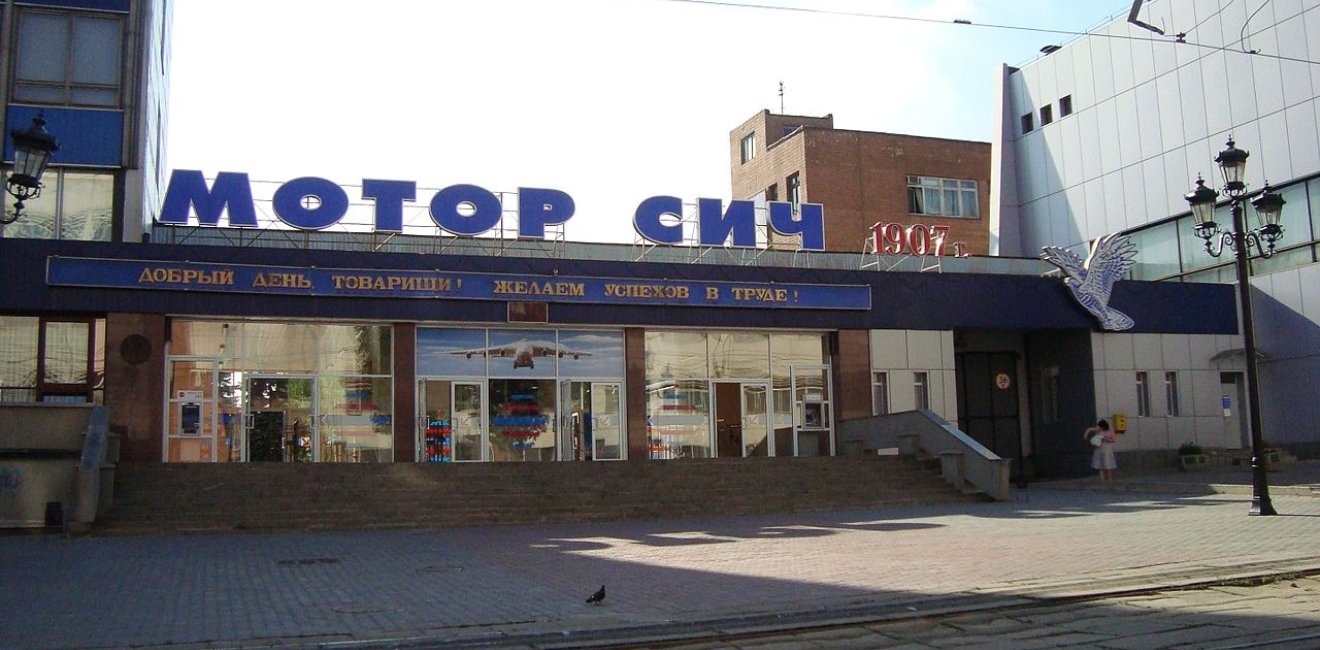
A blog of the Kennan Institute
BY OLENA LENNON
China's rapid military modernization over the last two decades has been of growing concern to policymakers in Washington. The United States' 2018 National Defense Strategy reflects these concerns unambiguously by recognizing the "magnitude of the threats" posed by China as America's top national security priority. The feeling is mutual. China has signaled repeatedly it will leave no stone unturned in its attempt to match the United States’ military capabilities, especially in aviation, an area in which China lags significantly behind. Enter Motor Sich, one of the world’s largest manufacturers of civilian and military turbine engines. Since 2016, China’s aerospace company Skyrizon has been pursuing a controlling stake in Ukraine's famed engine-maker, located in Zaporizhzhia, in eastern Ukraine. Access to Motor Sich technology could arguably allow China to mass produce its own fighter jets and challenge the United States in air superiority.
China's investment might appear to be a welcome relief for cash-strapped Motor Sich, which lost its main export market, Russia, in 2014 and is in desperate need of a lifeline. The much sought-after technology used by Motor Sich is developed and patented by “Ivchenko-Progress,” a state-owned enterprise specializing in aircraft engine design, manufacture, and repair. The company’s CEO Ihor Kravchenko had made multiple statements reassuring the government that the technology would remain the intellectual property of the company and would not be sold together with the shares of Motor Sich, but his reassurances fell on deaf ears. Despite the defense giant's dire financial straits, however, the Antimonopoly Committee of Ukraine blocked Skyrizon's purchase of Motor Sich in 2016, and a renewed attempt in 2019, citing violations of antitrust laws and the transfer of sensitive military technology. No less compelling in that decision was US pressure to scrap the deal. Indeed, the deal between Motor Sich and Skyrizon seemed to have become yet another sticking point in the military and political rivalry between China and the United States, leading to the latter’s rather intrusive maneuvering in Ukraine to block China from acquiring the crown jewel of Ukraine’s military-industrial complex. It is questionable, though, whether this pressure campaign will yield any direct benefits to the United States. Besides, creating a loss for China does not automatically create a win for the United States.
While the importance of technological overmatch for the United States’ conventional deterrence posture with China should not be downplayed, using political manipulation to deny the Chinese access to Ukraine’s engine-maker is unlikely to create any significant impediments to China's military modernization. Such an impediment would be conceivable only if China's penetration into Ukraine hypothetically pitted China against Russia. However, this outcome is equally unlikely as the current Sino-Russian level of cooperation is the strongest it has even been. Some even say it is "truly historic," especially in the military sphere. [1]
Not only is Russia not threatened by China’s military advancement, with or without Ukraine's help, but it might actually welcome it, a dynamic Michael Kofman of the Center for Naval Analyses describes as somewhat of a “paradox: The more advanced the Chinese military is, the less providing it with military technology poses a meaningful added military risk to Russia.” Thus, in addition to Russia selling its top-notch conventional weapons to China, in 2019 Vladimir Putin revealed that Russia was helping China build a missile attack early warning system, which signified a “qualitative raise” in the two countries’ cooperation.
Taking this line of argument further, it is questionable whether the loss of Motor Sich, regardless of who controlled it, would weigh heavily in Russia's geopolitical calculations. While Russia's military has in fact been heavily reliant on Motor Sich to supply aircraft engines for the bulk of the Russian military helicopter fleet, the severance of trade between Russia and Ukraine has pushed Russia to explore import substitution options. Thus, Russia recently announced the opening of a new center for helicopter engine production that will allegedly start producing Russia’s own ТВ3-117 and analogous engines. But perhaps an even more effective "import substitution" tool for Russia has been Motor Sich’s alleged continued (illegal) supplies to Russia via Belarus, Serbia, and Bosnia and Herzegovina. [2] If China were to acquire Motor Sich, it would give Russia yet another “import substitution” option, said Yurii Poita, head of the Asia-Pacific Section of the Center for Army, Conversion and Disarmament Studies, in a July 29 interview with me: “If China could start producing engines under the ‘Made in China’ label to meet the needs of PLA, it is not implausible that they [the engines] could also be exported to the Russian market.”
With that in mind, the US pressure campaign to prevent China from controlling Ukraine's engine-maker would seem more effective if the United States could offer alternatives to the Chinese investment. (Indeed, in early November 2019, the Wall Street Journal reported that Erik Prince, a private defense contractor and an informal adviser to US president Donald Trump, had been in talks with Ukrainians to acquire Motor Sich, but that nothing had come of the talks.) But since the US government cannot dictate to American private companies where to invest, tempting though such strong-arming might be, it is left with no choice but to be more strategic in incentivizing foreign investments that align with US national interests. More important, the United States should continue helping Ukraine strengthen its state capacity and investment climate—focused on confidence-building measures and rule of law—to attract Western investors, thereby advancing the West’s strategic goals in the region.
In the meantime, no matter how loudly the United States may sound the alarm over China’s rapid technological advances with the help of Ukraine, the American pressure campaign in Ukraine is unlikely to hamper China’s military ambitions. The campaign’s main value lies in a symbolic expression of support for Ukraine, a loyal partner that has signaled continuously, both with its declaratory policy and through its actions, that it sees the United States as a defining vector in its foreign policy. Regardless of what happens to Motor Sich, the United States should value and recognize this loyalty. But ultimately, it is up to the Ukrainian government to decide how to protect its national interests. The prevailing opinion among Ukraine's analysts is that the Chinese cash injection is not worth sacrificing Ukraine’s long-term strategic interests in protecting its military technology. “The worst-case scenario is when our technology gets transferred to China practically for nothing—$100 million is like a couple of tanks,” Poita said. It is unclear for how long Motor Sich can be stuck in limbo, but as one US defense official told me, unless the United States is ready to step up to the plate and help Motor Sich secure alternative investments, it may soon find itself in a situation in which its only remaining option will be “to let Ukraine roll the dice with the Chinese.”
Notes
[1] See, for example, Vasily Kashin “The Current State of Russian-Chinese Defense Cooperation,” CNA, August 2019, https://www.cna.org/CNA_files/PDF/DOP-2018-U-018184-Final.pdf; Artyom Lukin, “The Russia–China entente and its future,” International Politics, June 13, 2020, https://doi.org/10.1057/s41311-020-00251-7; Michael Kofman, “The Emperors League: Understanding Sino-Russian Defense Cooperation,” War on the Rocks, August 6, 2020, https://warontherocks.com/2020/08/the-emperors-league-understanding-sino-russian-defense-cooperation/
[2] See also "Печальная судьба Вячеслава Богуслава: как глава "Мотор Сичи" торгует с Россией — Секретные материалы” [The sad fate of Vyacheslav Boguslav: how the head of "Motor Sich" trades with Russia—Classified “Sekretni Materialy” [Classified], September 11, 2020, https://tsn.ua/ru/video/video-novini/pechalnaya-sudba-vyacheslava-boguslava-kak-glava-motorsichi-torguet-s-rossiey-sekretnye-materialy.html?fbclid=IwAR1_wS8jnHVQ5WPWVhm4_PisNKwCoURkw8UCpGudQepJWcpIlaW—xDsjio
The opinions expressed in this article are those solely of the author and do not reflect the views of the Kennan Institute.
Author

Adjunct Professor of Political Science and National Security, University of New Haven

Kennan Institute
After more than 50 years as a vital part of the Wilson Center legacy, the Kennan Institute has become an independent think tank. You can find the current website for the Kennan Institute at kennaninstitute.org. Please look for future announcements about partnership activities between the Wilson Center and the Kennan Institute at Wilson Center Press Room. The Kennan Institute is the premier US center for advanced research on Eurasia and the oldest and largest regional program at the Woodrow Wilson International Center for Scholars. The Kennan Institute is committed to improving American understanding of Russia, Ukraine, Central Asia, the South Caucasus, and the surrounding region through research and exchange. Read more

Explore More in Focus Ukraine
Browse Focus Ukraine
Talking to the Dead to Heal the Living

Ukrainian Issue in Polish Elections


